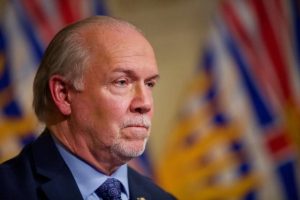Federal prosecutors told to avoid drug possession charges when possible in new directive

Federal lawyers are being asked to avoid prosecuting simple drug possession cases unless major public safety concerns are at play — a move that comes amid a push on the federal government to reconsider decriminalization.
The directive, which was issued earlier this week, revises the Public Prosecution Service of Canada’s (PPSC) approach to simple possession offences under the Controlled Drugs and Substances Act.
Director of Public Prosecutions Kathleen Roussel is now asking her team of lawyers to focus on seeking charges only in “the most serious cases” and to otherwise ask for alternative measures, such as restorative justice and Indigenous approaches to divert simple possession cases away from the criminal justice system.
“For example, where the possession relates to a substance use disorder, prosecution should generally be avoided where the offender is enrolled in a drug treatment court program or a course of treatment provided under the supervision of a health professional,” said PPSC spokesperson Nathalie Houle in an email.
“When deciding whether to initiate and conduct any prosecution, PPSC prosecutors must consider not only whether there is a reasonable prospect of conviction based on the evidence available but also whether a prosecution serves the public interest.”
Cases meriting charges could involve children or young people at risk, weapon, threats, acts of violence or isolated communities, according to the new directive.
Houle said the federal agency has been reviewing its prosecution policies in light of public health research and the ongoing opioid crisis.
Mounting calls for decriminalization
Liberal MP Nathaniel Erskine-Smith, who has been pushing his own party on the issue and has introduced two private member’s bills dealing with drug possession, said it’s a step in the right direction. But he wants criminal offences for low level possession to be wiped off the books entirely.
“There continue to be political challenges, but I do hope with prosecutors and police chiefs and more on board that that conversation changes very quickly,” he said.
“I’m more hopeful than I have been.”
The tweak comes amid a rising chorus of voices calling on the federal government to change its position on illicit drug decriminalization.
Back in May more than 50 human rights, drug and legal policy groups sent a letter to the health and public safety ministers asking them to halt criminal charges for simple drug possession as part of its response to COVID-19, arguing the pandemic has led to more dangerous drug use practices and a spike in overdose deaths.
A few weeks later the Canadian Association of Chiefs of Police — a non-profit that represents about 1,300 police chiefs from federal, First Nations, provincial, regional, transportation and military police services across the country — issued a statement calling on federal lawmakers to decriminalize the possession of small amounts of illegal drugs for personal consumption.
“Arresting individuals for simple possession of illicit drugs has proven to be ineffective. It does not save lives,” said CACP’s president Chief Const. Adam Palmer at the time.
And just last month British Columbia Premier John Horgan — whose province has seen a spike in overdoses during the pandemic — urged the prime minister in a letter to decriminalize possession for personal use.
In his letter, Horgan said such a move would “reduce the systemic stigma associated with illicit drug use and support people to access the services that they need.”

Erskine-Smith said he hopes the issue will receive attention when Parliament resumes in September.
“When Parliament resumes, the opioid crisis will not have gone away. The fact that our current laws have proven to be ineffective will remain true and we need to continue to pursue policies that treat drug use as a health issue and that means removing the criminal sanctions for low-level possession,” he said.
June was the worst month for overdose deaths in B.C. history with the BC Coroners Service recording 175 people dying of illicit-drug overdoses.
The numbers for July are not available yet, but paramedics said they had their busiest months on record since the overdose emergency was declared four years ago.
Across that province, paramedics responded to 2,706 overdose calls in July, well above the usual monthly average of around 2,000 calls, according to BC Emergency Health Services.
CBC








Redes Sociais - Comentários